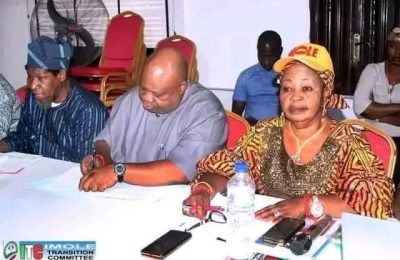

Testing the workability of the constitution
THERE is no political system that is completely faultless neither is there one that is totally bad. All depends on the operation and the Peoples’ Collective resolve to make it work. After all, the system is made for the people and not the other way round. The same thing applies to the constitution of any nation across the globe. it is instructive to note that the 1999 constitution retains the presidential system of government as entrenched in 1979 Constitution. By this token, Nigeria retains its federal structure with its concomitant separation of powers among the three organs of government.

The Fourth Republic
The fourth Republic which commenced on 29th May, 1979 is so short and also so long. It is so young because in political experimentation it may not be adequate enough for a thorough appraisal in the real sense of it. It took some notable democracies of the world like the United States of America, Britain, France to mention just a few hundreds of years of political experimentation to stabilize and arrive at their respective “home grown” political systems. Seven years plus might also be too long in that given the Nigerian factor, it may not require so many years as in advanced democracies of the world to evolve a workable “Nigerian political system”. Be that as it may, our task here is to do a critical examination of our political journey so far using the 4th Republic as our yardstick in order to arrive at a just conclusion as to whether or not there is any hope for the sustenance of democracy in Nigeria.
The 1999 Constitution
The Constitution of the Federal Republic of Nigeria 1999, upon which the 4th Republic rests is a comprehensive piece of statute. With 320 sections under 8 chapters, perhaps Nigeria’s constitution ranks among the most comprehensive in the whole world even more than that of the United States of America whose Presidential System of government Nigeria is copying. But in spite of its comprehensive nature, the constitution still harbours certain fundamental flaws and inadequacies. Chief among the “flaws” (at least from the perception of the general public right from the inception of the constitution in 1999) are the following:- • immunity from legal proceedings – Section 308 • qualifications for elections – Sections 65,66 for National Assembly; Section 131 for President; Section 177 for Governor • Public Revenue – Section 162 • Removal of President or Vice President – Section 143 • Removal of Governor of Deputy Governor from office Section 188 • Removal of Judicial Officers from Office – Section 292 • Declaration of State of Emergency – Section 305
Time and space would not allow me to delve into details of some of the flaws enumerated above. But I shall endeavour to concentrate on the removal of Chief Executives especially Governors as well as the vexed issue of “immunity”. As I said earlier in this discourse, the workability or otherwise of any chosen system by any nation depends entirely on the people of that nation. This is the age long truism based on the established fact that no system (or even the constitution) will operate itself in vacuo. It is either the operators allow it to be in which case the provisions, say of a constitution, are given full effect in the interest of the polity or is trampled upon. In other words the constitution is recognized in breach than in operation.
Corruption, immunity and removal (Impeachment)
If there is anything that has dominated Nigeria’s political landscape in recent years, it is the vexed issue of corruption of state executives vis-à-vis the constitutional provisions on removal popularly called impeachment of state Governors. Let me state it here that the constitution employs the word “removal” as opposed to “impeachment” although the two words aim at the same end: the unceremonious vacation of the offices specified therein.
Corruption
There is no way we can talk of sustenance of democracy without delving into the issue of corruption. And it is an open secret that until very recently, Nigeria occupied the unenviable position of the second most corrupt nation in the world. This was the verdict of Transparency International an international body. I make bold to say that before making such declaration, Transparency International usually does its homework with mathematical precision. The Constitution of the Federal Republic of Nigeria 1999 expressly forbids corruption. For the sake of clarity, section 15(5) provides: “The State shall abolish all corrupt practices and abuse of power.”
The word “state” here means Nigeria and not Ondo State or Sokoto State. This accords with international usage of the word. By the same token, since all the thirty six states of the federation including the Federal Capital Territory constitute the “State” of Nigeria, it follows that the abolition of corruption in all ramifications should be a collective effort. Put in another form, both the federal and the state governments have the constitutional responsibility of expunging corruption from the social and political fabric of Nigeria. Having said this, the next question one should ask is:- What are the consequences of the breach of this all-important provision of the constitution by the political Chief Executives?
It is my view that on the issue of corruption, you either embrace it or reject it. There is no middle course to it at all. In a situation where, for example, a state Governor not only harbours corruption but swims in it, what happens to him especially where there are cogent and convincing evidence/materials establishing his corrupt tendencies? This naturally leads me to the questions of impeachment and immunity of the relevant office holders. But first let me treat immunity. Credit must be given to our President and Commander-in-Chief of the Armed Forces of the Federal Republic of Nigeria, Chief Olusegun Obasanjo, GCFR, for his determined efforts to stamp out corruption in Nigeria. His bold steps in initiating the processes that led to the birth of ICPC.
Independent Corrupt Practices Commission (ICPC) and Economic and Financial Crime commission (EFCC) are highly commendable. Posterity will certainly laud his efforts in this regards. Regardless of the initial opposition of Ondo State Government to the powers of Independent Corrupt Practices Commission (ICPC) a sister body to EFCC, in a case instituted at the Supreme Court which was decided against it, it is however gratifying that today ICPC and EFCC have come to stay. The achievements of EFCC for example in so short a time are an eloquent testimony to the wisdom in establishing the body. The President no doubt realised the enormity of the problems posed by the cankerworm of corruption and the need to take them frontally when, at the inauguration of Independent Corrupt Practices Commission (ICPC) on 29th September, 2000, he said: “With corruption, there can be no sustainable development, nor political stability. By breeding and feeding on inefficiency, corruption is literally the antithesis of development and progress.”
And His Excellency knew very well that he could not fight the battle alone even if he is endowed with 264 million eyes (belonging to 132 million Nigerians). The establishment of the two aforementioned bodies therefore became a foregone conclusion. This was in accordance with His pledge to Nigerians at his swearing-in on 29th May, 1999. Perhaps we may wish to ask ourselves, what is the nature of corruption and of what relevance is it to the issue of sustenance of democracy especially in this 4th Republic? Let me start by saying that bribe-giving or bribe-taking is not the beginning and end of corruption. And like adultery, it is not committed in the public. Corruption, it must be noted, “encompasses any use of power by anybody in government for capricious or arbitrary purpose or any other purpose foreign to which it is meant.” It is also pertinent to state that corruption could take different forms. For example, bribe, acceptance of favour, succumbing to undue influence, yielding to intimidation from superior body, perversion of course of justice to mention just a few are all incidences of corruption.
Again, with the way and manner corruption is associated with Nigerians, one might be tempted to ask: Is corruption part of our culture? Has it always been like this? Let us go down the memory lane a bit.
Before the introduction of foreign culture and, by extension, foreign legal systems and until very recently, crimes were very much detested and almost unheard of; violence and other wrongs were rate; societal codes of conduct were religiously obeyed. The citizens were hemmed in at every turn by the established rules of conduct and customs, so much so that the citizens were incapable of departing from their dictates or even contemplate conduct inconsistent with them. The rule was that whatever was established and whatever had always been done ought and should be done. In those glorious days, the travelers had nothing to fear at night, movable properties were so safe that a buyer could purchase goods like food items and leave money on the counter even when the owner was not there! At least, I remember this practice on many occasions. And most gladdening enough, there was never any incidence of theft of such monies left on the counter. What a glorious era!
Today, the traditional values have been thrown overboard. Worse still, our judicial system has not helped matters at all, due largely to the wholesale adoption of English law consequent upon our colonial experience. Commenting on the painful evil effects of contact with Europeans, Dr. Lucas said the following: “One of the painful results of the contact between Western civilization and primitive culture is the removal of powerful sanctions of morality centered around the dread of jujus or ‘medicines’ and the substitutions for them of sanctions which operate ineffectively as deterrents from evil doing. Well may the native exclaim:…..Non-natives often say that the primitive native possesses a higher sense of morality than the civilized native. Whilst such a generalization is not wholly admissible, the fact that must be stated is that the unsophisticated natives still have the privilege of being guided by efficient sanctions of morality which the citilized or semi-civilized native had been deprived of and for an equivalent which operate with the same force is left unprovided for or being gradually understood. A form of civilization which destroys age-long practices and sanctions of morality without providing adequate substitution is a curse rather than a blessing to civilization or to West Africa in general.”
Now the politics of the 4th Republic has not differed from what we are accustomed to at least in Nigeria’s post-independence experience. The only exception being 1977 election when we tried for a very short period zero party option. Emphasis was strictly on ability and genuine willingness to serve as opposed to desire to grab and or embezzle. The long and short of all this is that party system is contributory factor to the high incidence of corruption in Nigeria.
Immunity
There is a general misconception among our people regarding the question of immunity. Sad enough, this also includes well educated people. And you may ask: does immunity also extend to removal, that is, impeachment of a State Governor regardless of the allegations leveled against him? The answer is a capital No. Immunity from legal proceedings as provided for by the constitution does not extend to “immunity from impeachment”. In fact, there is nothing like immunity from impeachment. For the avoidance of doubt. Let us quickly examine the relevant provisions of the Constitution.
Section 308 of the 1999 Constitution provides:- “308-(1) Notwithstanding anything to the contrary in this constitution, but subject in subsection (2) of this section – (a) no civil or criminal proceedings shall be instituted or continued against a person to whom this section applies during his period of office; (b) a person to whom this section applies shall not be arrested or imprisoned during that period either in pursuance of the process of any court or otherwise; and (c) no process of any court requiring or compelling the appearance of a person to whom this section applies, shall be applied for or issued.
Provided that in ascertaining whether any period of limitation has expired for the purpose of any proceedings against a person to whom this section applies, no account shall be taken of his period of office.
(2) The provisions of subsection (1) of this section shall not apply to civil proceedings against a person to whom this section applies in his official capacity or to civil or criminal proceedings in which such a person is only a nominal party;
(3) This section applies to a person holding the office of President or Vice President, Governor or Deputy Governor; and the reference in this section to “period of office” is a reference to the period during which the person holding such office is required to perform the functions of the office.”
I have reproduced verbatim the entire provisions of Section 308 if only to demonstrate the fact that the much taunted immunity against legal proceedings does not preclude the long arms of the law from reaching and grabbing a corrupt State Governor after he will have been removed from office even on the grounds of corrupt alone.
It should be emphasized that the whole purport of Section 308 of the 1999 Constitution is to allow the holders of the offices specified therein an unfettered liberty in the discharge of the constitutional responsibilities for the overall good of the people without being tied down with legal actions. No more. Any attempt to read other things into that provisions will only tantamount to an invasion of the constitution itself.
To be continued…
AARE AFE BABALOLA, OFR, CON, SAN, LL.D (Lond.)
Read Also: Subsidy removal: Uzodinma tasks media on adequate enlightenment








